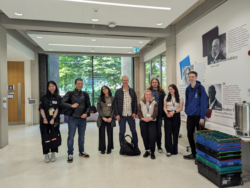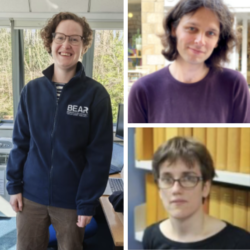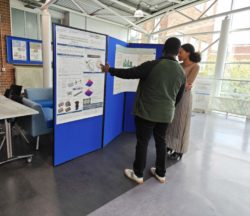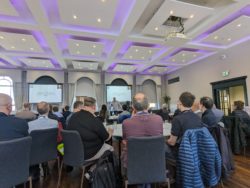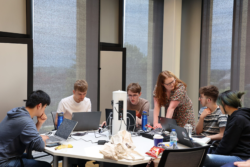In this case study we hear from Oskar Soulas, a PhD student in Chemistry, who has been using BlueBEAR to investigate lithium–sulphur–nitrogen solid electrolytes for next-generation battery technologies. I am a second year PhD student in the Scanlon Materials Theory Group (SMTG) based at the University of Birmingham. The group uses powerful computational tools to understand … Continue reading “Atomic Simulation to Build Better Batteries”
Tag: training
BEAR helps delve into the infant gut and malnutrition
In this case study we talk to Leon, a PhD student in the Department of Microbes, Infection and Microbiomes, who is using bioinformatics of microbes that encompass the human gut microbiome. The human gut is inhabited by trillions of microbial cells and most of those cells have very important roles in human health. My work … Continue reading “BEAR helps delve into the infant gut and malnutrition”
Reflections from the BEAR Conference 2025
The 14th annual BEAR Conference, a vibrant event organised by postgraduates for postgraduates, took place on 22 May 2025 at the Alan Walters Building—and what a fantastic day it was! With 55 attendees, the conference was packed with insightful talks, lively discussions, and a strong sense of community. Dietmar Heinke, Chair of the BEAR User … Continue reading “Reflections from the BEAR Conference 2025”
May 2025 BEAR Newsletter
Birmingham Environment for Academic Research (BEAR) Newsletter As we head into summer, we have a busy events season starting this week with the HPC-SIG in Cambridge, the Thesis Submission event for PGRs, and the BEAR Conference. Hopefully you will have seen that our summer programme of BEAR training workshops (being held online) has now been released, and you can … Continue reading “May 2025 BEAR Newsletter”
Utilising BEAR workshops for Multimodal Analysis in Cognitive Translation Research
In this case study, we hear from Mingjie Zhang, a postgraduate researcher in the Department of Languages, Cultures, Art History and Music (LCAHM), who has been leveraging BEAR workshops to apply digital humanities methods in her project “Translating between Minds: Cognitive Insights of the Dao De Jing.” By integrating tools such as R, Python, Matlab, and GitHub—learned … Continue reading “Utilising BEAR workshops for Multimodal Analysis in Cognitive Translation Research”
February 2025 BEAR Newsletter
Birmingham Environment for Academic Research (BEAR) Newsletter This month we will be meeting new staff starters at the Central Induction and delivering the ‘Data and AI for Researchers’ session for the fully-booked UoB Data Conference, with researchers from across the University describing how they are using our services to benefit their research – we will provide … Continue reading “February 2025 BEAR Newsletter”
BEAR PGR/ECR Conference opportunity 2025
We are starting to plan for the 14th BEAR conference – an event originally created to give PhD students experience in running a conference, as well as provide a showcase for the fantastic research done on services provided by Birmingham Environment for Academic Research (BEAR). With previous support from the Graduate School and our suppliers, … Continue reading “BEAR PGR/ECR Conference opportunity 2025”
September BEAR Newsletter
Birmingham Environment for Academic Research (BEAR) Newsletter September is the month for RSECon and this year, several of our Research Software Engineers (RSE) headed to Newcastle, where Gavin Yearwood and James Tyrrell led a successful lunchtime meeting of RSE’s involved in their own regional subgroups, with a large number of our local RSE Midlands members attending. Data-related … Continue reading “September BEAR Newsletter”
June BEAR Newsletter
This month we cover lots of past and future events, with blog posts on the BEAR Conference and Baskerville Showcase, together with details on a session at the Postgraduate Research Festival and the BioFAIR Roadshow. We also have some articles on life within the Advanced Research Computing team, to give you an insight into our … Continue reading “June BEAR Newsletter”
May BEAR Newsletter
We’re excited to announce the winner of our 2024 ‘IT Needs of Active Research’ survey prize, with the £500 Amazon voucher going to a researcher in Computer Science! Matt said, “I’m grateful for the opportunity to contribute to the improvement of our computing services. Winning the prize is an unexpected bonus!” We extend our thanks … Continue reading “May BEAR Newsletter”



